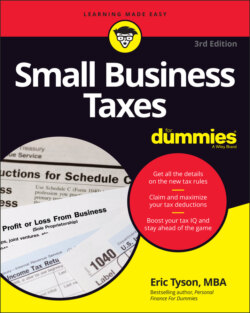Читать книгу Small Business Taxes For Dummies - Eric Tyson - Страница 15
Factoring taxes into small business decisions
ОглавлениеTaxes infiltrate many areas of your small business and your personal finances. Some people make important financial decisions without considering taxes (and other important variables). Conversely, in an obsession to minimize or avoid taxes, other people make decisions that are counterproductive to achieving their long-term business and personal financial goals. Although taxes are an important component to factor into your major business and financial decisions, taxes shouldn’t drive or dictate the decisions you make.
The following list shows some of the ways that tax issues are involved in making sound financial decisions throughout the year.
Type of business and benefits offered: The type of business entity you select for your business — sole proprietorship, limited liability company (LLC), S corporation, and so on — can have significant tax and other consequences. The benefits you’re able to utilize and offer to your employees, if you have them, also have tax ramifications (see Chapter 2).
Retirement accounts: Taking advantage of retirement accounts can mean tens, perhaps even hundreds, of thousands more dollars in your pocket come retirement time. Offering retirement account access to your employees can also be a valuable employee benefit for recruiting and retaining good employees if they understand what they have. Refer to Chapter 3 for more on retirement accounts.
Spending: Throughout this book, I discuss myriad spending decisions you may face in your small business, such as buying equipment (Chapter 8), spending on employee benefits (Chapter 2), and so on. These decisions will often affect your taxes both now and in the future.
Protecting your assets: Some of your insurance decisions also affect the taxes you pay. You’d think that after a lifetime of tax payments, your heirs would be left alone when you pass on to the great beyond — but that’s wishful thinking. Estate planning can reduce the taxes that are siphoned off from your estate. See Chapter 5 to find out more about estate planning.
Tracking your business financials: Throughout the year, you should stay on top of your business’s income and expenses so that you can see your business’s financial health and record the numbers you need come tax time. Chapter 6 covers these important issues.
